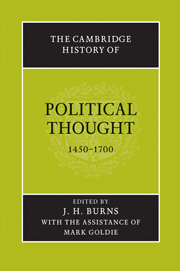Book contents
- Frontmatter
- Introduction
- I Renaissance and Counter-Renaissance
- II Religion, civil government, and the debate on constitutions
- III Absolutism and Revolution in the Seventeenth Century
- IV The end of Aristotelianism
- V Natural law and utility
- Conclusion
- Biographies
- Bibliography
- Index of names of persons
- Index of subjects
Conclusion
Published online by Cambridge University Press: 28 March 2008
- Frontmatter
- Introduction
- I Renaissance and Counter-Renaissance
- II Religion, civil government, and the debate on constitutions
- III Absolutism and Revolution in the Seventeenth Century
- IV The end of Aristotelianism
- V Natural law and utility
- Conclusion
- Biographies
- Bibliography
- Index of names of persons
- Index of subjects
Summary
Sharp chronological lines can seldom be confidently drawn across the page of any historical record – and never in the history of ideas. Yet a book must end somewhere, and it is desirable that the point at which it ends should be supported by some kind of rationale. In the present case, that rationale cannot well be derived from the general history of the period. The turn of the century in 1700 was not, even if we allow for some years' margin on either side, distinguished by any significant turning point in European development. Yet in intellectual history there is at least a certain sense, at that point or soon afterwards, of a stage being cleared by the demise of leading characters. Of the major thinkers discussed above perhaps only Leibniz (d. 1716) survived much beyond the earliest years of the new century. And by coincidence the year 1704 was marked by the deaths of two figures whose ideas encapsulate some of the main contrasting and indeed conflicting tendencies in the political thought of early-modern Europe.
John Locke and Jacques-Bénigne Bossuet did not, it is true, meet in controversy as Filmer did, posthumously, with Locke. Yet there is, it can be said, an implicit dialectic in which the thesis advanced by Bossuet, particularly in his Politique tireé des propres paroles de l'Ecriture sainte, is met and challenged in Locke's Two Treatises of Government. Where Locke sees an all but indissoluble link between power that is absolute and power that is arbitrary, and an almost inevitable degeneration from that conjuncture into the tyranny of the ruler and the slavery of his subjects, Bossuet rejects both the equation and the deduction: for him the king's absolute power, neither despotic nor tyrannical, is ‘sacred, paternal, and subject to reason’.
- Type
- Chapter
- Information
- The Cambridge History of Political Thought 1450–1700 , pp. 653 - 656Publisher: Cambridge University PressPrint publication year: 1991

